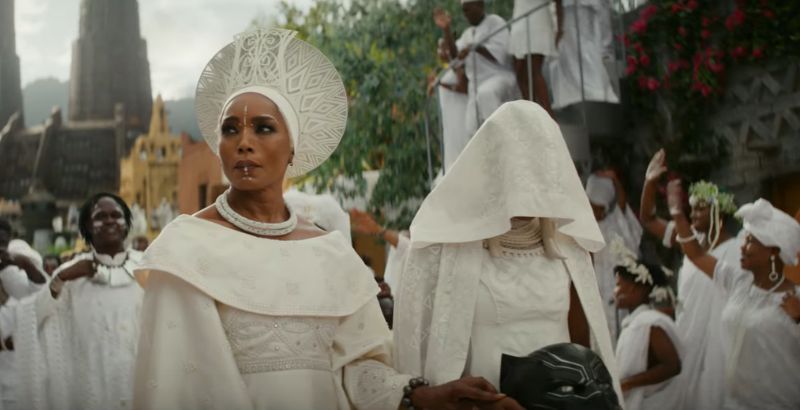
Black Panther: Wakanda Forever is a film that was dealing with a lot. Not only did it serve as a sequel to the first Black Panther, but it was also a way for Ryan Coogler and the rest of the cast to deal with the loss of Chadwick Boseman. That loss is woven throughout Wakanda Forever‘s story, as characters are shown dealing with grief in different ways. Princess Shuri (Letitia Wright) buries herself in her lab. Queen Ramonda (Angela Bassett) attempts to lead a nation while fending off invading forces who seek Wakanda’s vibranium. And Okoye (Danai Gurira) continues to lead the Dora Milaje in the wake of the Black Panther’s death.
Wakanda Forever also serves as the end of Marvel Studios’ Phase 4, which has incorporated limited television series in addition to its movie output over the past two years. While discussion over Phase 4’s merits has been mixed, after watching Wakanda Forever it’s clear that the entire theme throughout the past two years has been the underlying grief that was left in Avengers: Endgame‘s wake. Not only are some of the heroes dealing with being gone for five years, but they also have to deal with the loss of their comrades. And unlike many of the threats they’ve battled, grief isn’t something that you can smash into pieces with a magic hammer or banish to another dimension. It’s something that will always be a part of you, and you have to learn to live with it.
It’s that lesson that Shuri has to learn in Wakanda Forever. She carries an immense amount of guilt over not being able to save T’Challa’s life in a critical moment, which is why she’s holed herself up in her lab. “I wasn’t trying to save the Black Panther,” she confesses in a later scene. “I was trying to save my brother.” It’s a raw, human moment that shows her grief is eating away at her. Ramonda is also dealing with her own grief over losing her son, and it bubbles up to the surface when she believes Namor (Tenoch Huerta Mejía) has killed Shuri. When Okoye begs her not to strip her of her rank as the Dora Milaje’s general, Ramonda explodes: “I am queen of the most powerful nation in the world, and my entire family is dead! Have I not given enough?!”
Not only is this a great moment from Bassett – who is the film’s MVP – but it also lets Ramonda be human. Too often, Black women in movies have to be strong: for their families, their husbands, etc. Rarely are they allowed to show any emotion other than silent dignity or resolve in the face of challenges. But in Wakanda Forever, Coogler makes sure that the female characters actually have dimension. They’re allowed to feel, and even fail. And that makes their journey all the more worthwhile. And it’s not the first time Coogler has done this. He employed a similar tactic in the first Black Panther film, as T’Challa would often seek out counsel from the women in his life.
T’Challa’s loss hangs heavily over the film, as it’s affected everyone in his life. Not only are his mother and sister dealing with his passing, but Nakia (Lupita N’yongo) has retreated from her homeland over the death of her lover. It shows how grief can affect us in different ways. Sometimes, people attempt to bury themselves in tasks to keep it at bay. Other times, they end up uprooting their entire life in order to outrace the hurt. Coogler’s best decision in Wakanda Forever is showing that no two people grieve the same way, or come to terms with loss in the same way.
As mentioned before, previous entries in Phase 4 had heroes going through the grieving process. In fact, the very first project, WandaVision, was all about how Wanda Maximoff attempted to deal with the grief of losing everyone she loved. But her process involved reshaping reality into a sitcom and punishing those who dared to take it away from her. And then she decided to try and cross universes to find her children, intending to sacrifice another child in the process. Wanda has become a prisoner of her grief, and as others rightfully point out it’s a lethal combination when mixed with her powers. Eventually, she decides to end her own life, finding a measure of peace in the process.
Another character who goes through his own cycle of grief is one of the MCU’s newest additions, the Master of Kung-Fu Shang-Chi. When his mother Ying Li died, his father Wenwu trained him to be a killing machine. Shang-Chi decided to escape and live a relatively normal life in America until his father comes calling for him and his sister Xialing. Their journey brings them to Tao-Lo, the place where Ying Li was born. While in Tao-Lo Shang-Chi starts to reconnect with his mother’s heritage while also confronting the trauma of her death and his anger toward his father. Wenwu himself suffered from immense grief over the death of his wife, and a malevolent force preys on that to try and get him to awaken. Shang-Chi is able to beat this force by utilizing the martial arts skills of his mother, as well as the Ten Rings that empowered his father. In the end, he embraces both halves of his family. Even though the pain of losing his parents is still fresh, he’s learned to live with it.

Shuri undergoes a similar journey in Wakanda Forever, as Ramonda is killed during Namor’s attack on Wakanda. Consumed by rage, she vows to kill the aquatic monarch – but eventually holds off when she sees a vision of her mother urging her to show him who they are. In choosing peace over vengeance, she follows in her brother’s footsteps and is finally able to let him go in the film’s closing sequence. This ending is a strong cap on both the film and Phase 4’s themes of grief. When watching Wakanda Forever, I kept thinking of a line T’Challa said in Captain America: Civil War: “In my culture, death is not the end.” Those words could sum up Wakanda Forever, and dealing with loss, in a nutshell. Death isn’t the end – at least not when it comes to the memories you share with your loved ones.
Even Namor has suffered the ebbs and tides of grief. He tells Shuri that shortly after his birth, he returned to the surface world to bury his late mother and witnessed Spanish missionaries enslaving the Maya. What should have been a day of peace turned to bloodshed as Namor directed his rage at the missionaries, slaughtering them and burning down their grief-filled. Ironically, one of the priests says that he is without love which leads to his namesake. But everything Namor has done is out of love for his people, even if those actions are destructive. He’s even shown mourning the death of a Talokani woman after Shuri and Riri’s escape. If anything, he loves and grieves with a capacity mere mortals can’t comprehend.
Through its characters, Black Panther: Wakanda Forever explores how people deal with grief in ways that are and aren’t healthy. It’s a fitting end for Phase Four, as other heroes went through similar journeys. I hope that future MCU entries continue to tackle these themes, as the mixture of adventure with emotion is the main reason why I keep coming back to superhero stories.
Black Panther: Wakanda Forever is now playing in theaters.






